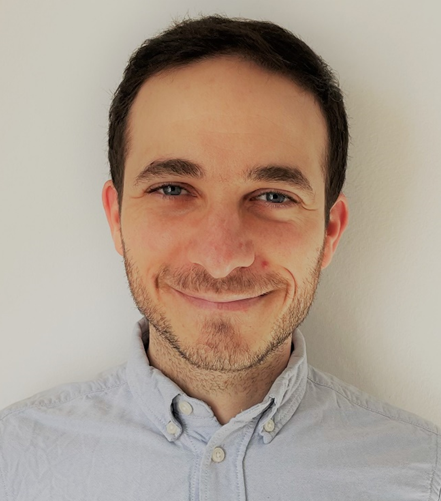Please note, nominations are now closed. We are pleased to announce our latest award winner below.
This Lectureship celebrates outstanding early career researchers, in academia or industry, who have made significant contributions in the fields of medicinal chemistry and drug discovery in their independent careers.
- This award is presented annually
- The nominations are shortlisted, and the winner is selected by a judging panel made up of the RSC Medicinal Chemistry Editorial Board
- The recipient of this award receives the opportunity to present at a relevant high-profile international meeting with a contribution of up to £1,000 to cover associated costs
Our latest award winner 2024
Professor Luca Laraia
Luca Laraia was born in Rome (Italy) and grew up in Vienna (Austria) before moving to London for his MSci degree in chemistry at Imperial College London. He carried out a PhD in medicinal chemistry and chemical biology funded by CRUK at the University of Cambridge, in the labs of Professors David Spring and Ashok Venkitaraman. He then moved to Dortmund as an Alexander von Humboldt post-doctoral research fellow to work at the Max Planck Institute of Molecular Physiology with Professor Herbert Waldmann, before joining the Department of Chemistry at the Technical University of Denmark as an assistant professor. Since April 2021 he is an associate professor at the same department, leading a research group at the interface of chemistry and biology, focusing on the development of chemical tools and potential therapeutic leads to study and modulate lipid homeostasis. Luca is the recipient of an ERC Starting Grant (2021) and a Hallas Møller Emerging Investigator (2021) from the Novo Nordisk Foundation.

See all our previous winners
Guidelines for nominators and candidates
Find out who is eligible for this award, about the nomination process and see who is on the selection panel.
Nomination deadline
Now closed
Lectureship announcement deadline
Early 2024
The RSC Medicinal Chemistry Lectureship is awarded through a process whereby nominations of candidates are invited from our community.
Open to all researchers globally
This Lectureship is open to all researchers throughout the world. This includes, but is not limited to, members of the Royal Society of Chemistry and researchers in academia or industry.
We believe we have a responsibility to promote inclusivity and accessibility to improve diversity. Where possible, we encourage each nominator to consider nominating candidates of all genders, races, and backgrounds. Please see our approach to Inclusion and Diversity.
Eligibility
To be eligible for the RSC Medicinal Chemistry Lectureship, the candidate must:
- Be an active medicinal chemistry researcher, either in academia or industry, carrying out research that is within the scope of the journal
- Be an independent researcher (this includes team leaders in industry and Research Associates or Fellows who run their own research group; PhD students and postdocs are not eligible)
- Be at an early stage of their independent career (this should typically be within 12 years of completing their PhD, but appropriate consideration will be given to those who have taken a career break, followed a different career path or work in systems where their time period to independence may vary). Please contact the Editorial Office if you have any queries
Nominations can be made by anyone and must be sent via email to the Editorial Office. Self-nominations are not permitted. All nominators will be asked to confirm that, to the best of their knowledge, their nominee’s professional standing is such that there is no confirmed or potential impediment to them receiving the Lectureship.
To nominate a candidate, please provide:
- The name, affiliation, website URL and contact details of the nominee
- An up-to-date nominee CV (3 page maximum)
- A letter of recommendation (500-word limit). Statements as to why a nominee is eligible if they are beyond 12 years of their PhD completion, for instance, due to career breaks, will not count towards this word limit
- Contact details for a confirmed supporting referee. Please inform your referee of the nomination – the Editorial Office will request a supporting letter of recommendation (500-word limit) from this referee once the nomination has been received, where the referee should comment in detail on specific contributions/achievements/potential. Referees must state their relationship with the nominee e.g. this could be the nominee’s postdoc or PhD supervisor, line manager, project manager or academic mentor
All eligible nominated candidates will be assessed by a judging panel made up of the RSC Medicinal Chemistry Editorial Board. Any Editorial Board members who have a conflict of interest will be removed from the selection panel.
The judging panel will consider the following core criteria:
- excellence in research, as evidenced with reference to originality and impact
- quality of publications/patents/software
- innovation
- collaborations and teamwork
- community and advocacy activities
Additional indicators of esteem will be considered by the judging panel where multiple nominees are judged equally meritorious in relation to these core criteria.
Previous winners
Current winner: Luca Laraia, Technical University of Denmark, Denmark
2023: Christoph Nitsche, Australian National University, Australia
2022: Nir London, Weizmann Institute of Science, Israel
2021: Jacob Bush, GSK and the Francis Crick Institute, UK
2020: Chandradhish Ghosh, Max Planck Institute of Colloids and Interfaces, Germany
2019: Amanda Hargrove, Duke University, USA
2018: Gonçalo Bernardes, University of Cambridge, UK
2017: Laura H. Heitman, Leiden University, Netherlands
2016: Alessio Ciulli, University of Dundee, UK
2015: Richard Payne, University of Sydney, Australia
2013: Christian Heinis, École Polytechnique Fédérale de Lausanne, Switzerland
Contact RSC Medicinal Chemistry Editorial Office
- Email:
- the team

